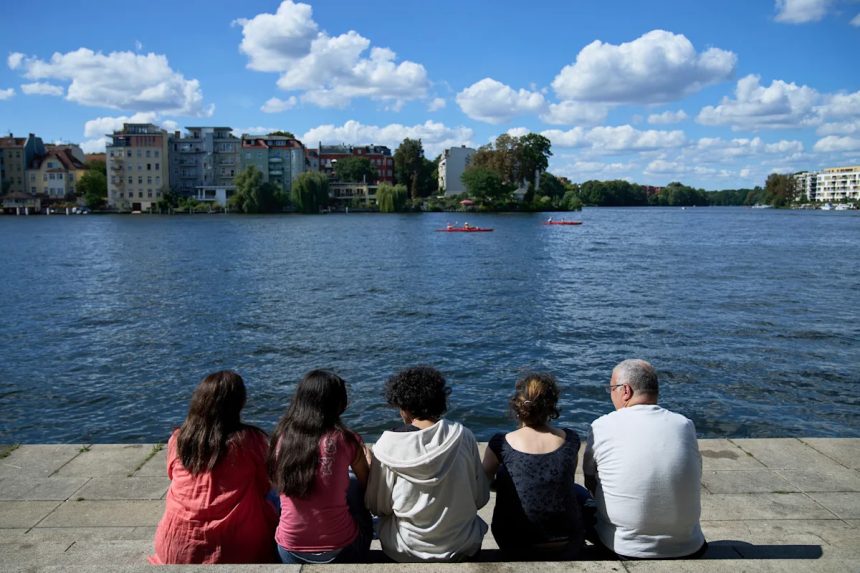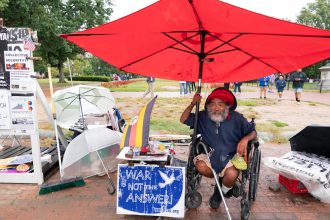BERLIN (AP) — Nearly a decade after fleeing Syria’s civil war, Rahaf Alshaar sat on her couch in a leafy suburb of Berlin sipping Arabic coffee spiced with cardamom.
When she, her husband and their three daughters arrived in Germany as refugees, they adapted quickly to their new country: learning the language, finding jobs and attending school.
“It was a lot of hard work, but I’m proud of what we achieved,” Alshaar, 44, told The Associated Press in a recent interview.
Earlier this year, the whole family became German citizens and bought a house with a nice garden.
“We are Germans,” said 52-year-old Basem Wahbeh, Alshaar’s husband.
Their family arrived among an influx of migrants from war-torn Syria, Iraq and Afghanistan who took refuge in Germany, peaking at more than 1 million in 2015. The arrival of so many asylum-seekers in a single year strained the country’s resources and brought consequences that Germany is still wrestling with a decade later, most notably the rise of far-right anti-immigration parties.
Even though the family’s integration into German society was a success, it was not without sacrifice. They and many others had to leave behind their homes, culture and language, sometimes shedding traditions dear to them.
Germany opens its doors
On Aug. 31, 2015, as Europe faced what was by then being called the refugee crisis, Chancellor Angela Merkel opened Germany’s borders to migrants. Facing criticism at home and abroad, Merkel famously promised citizens that “we will manage it.”
Refugees were initially welcomed with applause as they arrived at train stations. German families opened their homes to put them up for months as overwhelmed cities struggled to find accommodation.
In a massive effort, schools and community colleges quickly created tens of thousands of “welcome classes” for children and integration classes for adults to help them study German, get a job and find a home in their new country.
“A lot of things worked out surprisingly well,” said Jonas Wiedner, an expert on migration from the Berlin Social Science Center.
He noted migrants’ employment figures compare roughly to those of Germans, politicians acted quickly to offer help and money to local communities integrating the new arrivals and “civil society was very involved from the outset and has really achieved great things.”
Germany became the top asylum destination in Europe, with its total population rising by 1.2% in 2015 — the highest since 1992 — because of immigration, according to the Federal Statistical Office.
Over time, as more asylum-seekers arrived looking for better prospects, not necessarily fleeing danger, the surge of immigration fueled economic anxieties and xenophobic resentment among some Germans.
Starting a new life in Europe
Before the outbreak of Syria’s civil war in 2011, the Wahbeh family had a good life. He worked for many years at a company that made cookies, chocolate and juices while his wife raised their daughters. But as the war intensified, so did concerns about their family’s safety.
In December 2012, a bomb hit oldest daughter Rajaa’s elementary school while she was in class. She wasn’t injured, but the close call convinced them to leave.
“No more school. We have to leave,” Alshaar told her husband.
Alshaar and Wahbeh said the new beginning in Germany was difficult: They didn’t know the language, the winters were much colder than back home and the authorities initially did not recognize their university degrees.
Determined to succeed, they enrolled in German classes and initially took internships to get into the job market. Alshaar, who is a civil engineer by training, found a stable job at the transportation ministry and put her three daughters in a good high school.
“I’m really proud, and I was also lucky to have good people around me,” Germans who helped them as refugees and have become good family friends, Alshaar said. But she also encountered hostility as a foreigner, specifically for wearing a hijab.
The rise of polarization
Anger over migration has propelled the rise of the far-right Alternative for Germany party, or AfD, which would be the second largest party if an election were held today, according to polls. Voters elsewhere in Europe have increasingly been empowering far-right nationalist parties that promise to restrict immigration.
“It is a highly contentious political issue and has repeatedly provided ammunition for the far right,” Wiedner said.
In a recent poll that asked how well Germany “coped overall with the influx of almost 1.5 million refugees between 2015 and 2020,” only 21% answered “good,” 41% said “less good” and 37% said “not at all.” The data were collected by Forsa Institute on behalf of RTL Germany from Aug. 22 to 25. They questioned 1,006 people and the margin of error was plus/minus 3 percentage points.
During Germany’s election campaign at the beginning of this year, AfD’s candidate for chancellor, Alice Weidel, called for closing the borders to undocumented migration and large-scale deportations of asylum-seekers, making clear she has no problem with the politically charged term “remigration.”
Though many Germans have expressed their outrage in protests against the anti-immigration stance of the AfD, Chancellor Friedrich Merz from the center-right Christian Democrats also campaigned on the promise of ending “uncontrolled migration.” Once the new government was in power, it quickly boosted border controls to curb migration to Germany and started to speed up deportations of rejected and criminal asylum-seekers.
Alshaar said she has been watching the rise of the far right with concern but at the same time doesn’t want to let herself be intimidated because she feels her family has done everything right, even if integrating into German society wasn’t always easy.
Adapting to a new home
Germans asked her more than once if she had been forced to wear the hijab. At an appointment on a construction side outside Berlin, Alshaar was shown the middle finger.
Looking at a picture of her arrival in Germany — after an odyssey from Damascus to Lebanon, Egypt and finally Berlin — wearing a white headscarf tightly tucked around her face, Alshaar paused, ran a hand through her long, chestnut brown hair and said it took years of internal struggle before she decided to remove the hijab two years ago.
“It was difficult … because I had been wearing a headscarf for more than 30 years,” she said.
Her three daughters don’t want to wear a hijab. On the contrary, they look German, feel German and speak German without a trace of an accent.
Rajaa, 20, has finished high school and is applying to art schools, Razan, 17, will start her senior year after summer vacation and 13-year-old Raneen, who was elected class representative last year, will be in eighth grade soon.
“Many of my friends didn’t even know that I’m from Syria and were surprised when I told them so,” Rajaa said.
The parents are grateful to Germany for giving them a place to rebuild and relieved that their daughters have integrated so well, though Alshaar said it’s important to her that her family still speaks Arabic at home, watches Syrian TV series and celebrates Muslim holidays.
Despite the fall of Bashar Assad’s regime last year, they have no plans to return to their home country. But Alshaar said wistfully that she and her husband will always be homesick for Syria.
“I don’t want my daughters to grow up with this feeling of homesickness because it will always make them feel like they’re not complete,” she said.









